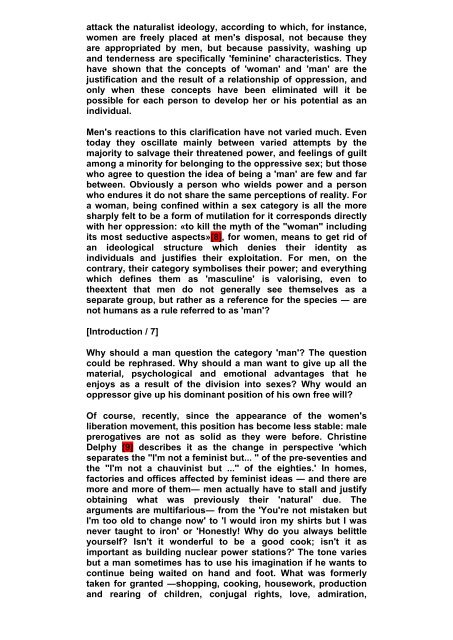emmanuel reynaud holy virility the social construction of masculinity
emmanuel reynaud holy virility the social construction of masculinity
emmanuel reynaud holy virility the social construction of masculinity
Create successful ePaper yourself
Turn your PDF publications into a flip-book with our unique Google optimized e-Paper software.
attack <strong>the</strong> naturalist ideology, according to which, for instance,<br />
women are freely placed at men's disposal, not because <strong>the</strong>y<br />
are appropriated by men, but because passivity, washing up<br />
and tenderness are specifically 'feminine' characteristics. They<br />
have shown that <strong>the</strong> concepts <strong>of</strong> 'woman' and 'man' are <strong>the</strong><br />
justification and <strong>the</strong> result <strong>of</strong> a relationship <strong>of</strong> oppression, and<br />
only when <strong>the</strong>se concepts have been eliminated will it be<br />
possible for each person to develop her or his potential as an<br />
individual.<br />
Men's reactions to this clarification have not varied much. Even<br />
today <strong>the</strong>y oscillate mainly between varied attempts by <strong>the</strong><br />
majority to salvage <strong>the</strong>ir threatened power, and feelings <strong>of</strong> guilt<br />
among a minority for belonging to <strong>the</strong> oppressive sex; but those<br />
who agree to question <strong>the</strong> idea <strong>of</strong> being a 'man' are few and far<br />
between. Obviously a person who wields power and a person<br />
who endures it do not share <strong>the</strong> same perceptions <strong>of</strong> reality. For<br />
a woman, being confined within a sex category is all <strong>the</strong> more<br />
sharply felt to be a form <strong>of</strong> mutilation for it corresponds directly<br />
with her oppression: «to kill <strong>the</strong> myth <strong>of</strong> <strong>the</strong> "woman" including<br />
its most seductive aspects»[8], for women, means to get rid <strong>of</strong><br />
an ideological structure which denies <strong>the</strong>ir identity as<br />
individuals and justifies <strong>the</strong>ir exploitation. For men, on <strong>the</strong><br />
contrary, <strong>the</strong>ir category symbolises <strong>the</strong>ir power; and everything<br />
which defines <strong>the</strong>m as 'masculine' is valorising, even to<br />
<strong>the</strong>extent that men do not generally see <strong>the</strong>mselves as a<br />
separate group, but ra<strong>the</strong>r as a reference for <strong>the</strong> species ― are<br />
not humans as a rule referred to as 'man'?<br />
[Introduction / 7]<br />
Why should a man question <strong>the</strong> category 'man'? The question<br />
could be rephrased. Why should a man want to give up all <strong>the</strong><br />
material, psychological and emotional advantages that he<br />
enjoys as a result <strong>of</strong> <strong>the</strong> division into sexes? Why would an<br />
oppressor give up his dominant position <strong>of</strong> his own free will?<br />
Of course, recently, since <strong>the</strong> appearance <strong>of</strong> <strong>the</strong> women's<br />
liberation movement, this position has become less stable: male<br />
prerogatives are not as solid as <strong>the</strong>y were before. Christine<br />
Delphy [9] describes it as <strong>the</strong> change in perspective 'which<br />
separates <strong>the</strong> "I'm not a feminist but... " <strong>of</strong> <strong>the</strong> pre-seventies and<br />
<strong>the</strong> "I'm not a chauvinist but ...'' <strong>of</strong> <strong>the</strong> eighties.' In homes,<br />
factories and <strong>of</strong>fices affected by feminist ideas ― and <strong>the</strong>re are<br />
more and more <strong>of</strong> <strong>the</strong>m― men actually have to stall and justify<br />
obtaining what was previously <strong>the</strong>ir 'natural' due. The<br />
arguments are multifarious― from <strong>the</strong> 'You're not mistaken but<br />
I'm too old to change now' to 'l would iron my shirts but I was<br />
never taught to iron' or 'Honestly! Why do you always belittle<br />
yourself? Isn't it wonderful to be a good cook; isn't it as<br />
important as building nuclear power stations?' The tone varies<br />
but a man sometimes has to use his imagination if he wants to<br />
continue being waited on hand and foot. What was formerly<br />
taken for granted ―shopping, cooking, housework, production<br />
and rearing <strong>of</strong> children, conjugal rights, love, admiration,
















